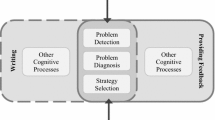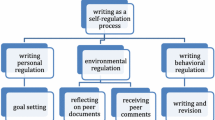Abstract
Research on peer reviewing has revealed that comments received from peer reviewers are helpful when it comes to making revisions in an individual’s writing, but the role of providing comments to peer writers has been little explored despite the potential value of such research. In this study, we explored how student reviewers learn by reviewing peer drafts in the context of reciprocal peer reviewing. Undergraduate students in an introductory physics course participated in this study as part of their course activities. Participants wrote technical research drafts, reviewed three or four peer drafts, and revised their own drafts in the SWoRD system. A total of 3,889 comment segments were analyzed in two dimensions: (a) evaluation (strength vs. weakness) and (b) scope (surface, micro-meaning, and macro-meaning). We found that providing weakness comments for micro-meaning and strength comments for macro-meaning improved the reviewers’ writing qualities. In addition, reviewers’ initial writing skills and the quality of reviewed peer drafts influenced the types of comments given. The results are discussed, along with their implications for improved writing through reviewing.

Similar content being viewed by others
References
Althauser, R., & Darnall, K. (2001). Enhancing critical reading and writing through peer reviews: An exploration of assisted performance. Teaching Sociology, 29, 23–35.
Anderson, T., Howe, C., Soden, R., Halliday, J., & Low, J. (2001). Peer interaction and the learning of critical thinking skills in further education students. Instructional Science, 29, 1–32.
Beach, R., & Friedrich, T. (2006). Response to writing. In C. A. MacArthur, S. Graham, & J. Fitzgerald (Eds.), Handbook of writing research (pp. 222–234). New York: Guilford Press.
Beason, L. (1993). Feedback and revision in writing across the curriculum classes. Research in Teaching of English, 27(4), 395–422.
Berg, E. C. (1999). The effects of trained peer response on ESL students’ revision types and writing quality. Journal of Second Language Writing, 8(3), 215–241.
Braaksma, M. A. H., Rijlaarsdam, G., & van den Bergh, H. (2002). Observational learning and the effects of model-observer similarity. Journal of Educational Psychology, 94(2), 405–415.
Braaksma, M. A. H., Rijlaarsdam, G., van den Bergh, H., & van Hout-Wolters, B. H. A. M. (2004). Observational learning and its effects on the orchestration of writing processes. Cognition & Instruction, 22, 1–36.
Butterfield, E. C., Hacker, D. J., & Albertson, L. R. (1996). Environmental, cognitive, and metacognitive influences on text revision: Assessing the evidence. Educational Psychology Review, 8(3), 239–297.
Butterfield, E. C., Hacker, D. J., & Plumb, C. (1994). Topic knowledge, linguistic knowledge, and revision processes as determinants of text revision. In E. C. Butterfield (Ed.), Children’s writing: Toward a process theory of the development of skilled writing (pp. 83–143). Greenwich, CT: JAI Press.
Chi, M. T. H. (2009). Active-constructive-interactive: A conceptual framework for differentiating learning activities. Topics in Cognitive Science, 1, 73–105.
Chi, M. T. H., & Bassok, M. (1989). Learning from examples via self-explanations. In L. B. Resnick (Ed.), Knowing, learning, and instruction: Essays in honor of Robert Glaser (pp. 251–282). Hillsdale, NJ: Erlbaum.
Chi, M. T. H., Bassok, M., Lewis, M. W., Reimann, P., & Glaser, R. (1989). Self-explanations: How students study and use examples in learning to solve problems. Cognitive Science, 13, 145–182.
Chi, M. T. H., de Leeuw, N., Chiu, M. H., & Lavancher, C. (1994). Eliciting self-explanations improves understanding. Cognitive Science, 18, 439–477.
Cho, K., & MacArthur, C. (2010a). Student revision with peer and expert reviewing. Learning and Instruction, 20, 328–338.
Cho, K., & MacArthur, C. (2010b). Learning writing by reviewing. Journal of Educational Psychology (under review).
Cho, K., & Schunn, C. D. (2007). Scaffolded writing and rewriting in the discipline: A web-based reciprocal peer review system. Computers & Education, 48(3), 409–426.
Cho, K., Schunn, C. D., & Charney, D. (2006). Commenting on writing: Typology and perceived helpfulness of comments from novice peer reviewers and subject matter experts. Written Communication, 23(3), 260–294.
Coleman, L., Jussim, L., & Isaac, J. (1991). Black students’ reactions to feedback conveyed by Black and White teachers. Journal of Applied Social Psychology, 21, 460–481.
Conati, C., & Vanlehn, K. (2000). Toward computer-based support of meta-cognitive skills: A computational framework to coach self-explanation. International Journal of Artificial Intelligence in Education, 11, 389–415.
Couzijn, M. (1999). Learning to write by observation of writing and reading processes: Effects on learning and transfer. Learning and Instruction, 9, 109–142.
Crampton, C. D. (2001). The mutual knowledge problem and its consequences for dispersed collaboration. Organization Science, 12(3), 346–371.
DiPardo, A., & Freedman, S. W. (1988). Peer response groups in the writing classroom: Theoretic foundations and new directions. Review of Educational Research, 58(2), 119–149.
Faigley, L., & Witte, S. (1981). Analyzing revision. College Composition and Communication, 32(4), 400–414.
Ferris, D. (1997). The influence of teacher commentary on student revision. TESOL Quarterly, 31, 315–339.
Flower, L., & Hayes, J. R. (1981). A cognitive process theory of writing. College Composition and Communication, 32(4), 365–387.
Flower, L., Hayes, J. R., Carey, L., Schriver, K., & Stratman, J. (1986). Detection, diagnosis, and the strategies of revision. College Composition and Communication, 37(1), 16–55.
Gick, M. L., & McGarry, S. J. (1992). Learning from mistakes: Inducing analogous solution failures to a source problem produces later successes in analogical transfer. Journal of Experimental Psychology: Learning, Memory, and Cognition, 18(3), 623–639.
Gielen, S., Peeters, E., Dochy, F., Onghena, P., & Struyven, K. (2010). Improving the effectiveness of peer feedback for learning. Learning and Instruction, 20(4), 304–315.
Graesser, A. C., & Person, N. K. (1994). Question asking during tutoring. American Educational Research Journal, 31(1), 104–137.
Graham, S., & Perin, D. (2007). A meta-analysis of writing instruction for adolescent students. Journal of Educational Psychology, 99(3), 445–476.
Hattie, J., & Timperley, H. (2007). The power of feedback. Review of Educational Research, 77(1), 81–112.
Holliway, D. R. (2004). Through the eyes of my reader: A strategy for improving audience perspective in children’s descriptive writing. Journal of Research in Childhood Education, 18, 334–349.
Holliway, D. R., & McCutchen, D. (2004). Audience perspective in young writers’ composing and revising: Reading as the reader. In L. Allal, L. Chanquoy, & P. Largy (Eds.), Revision of written language: Cognitive and instructional processes (pp. 87–101). Amsterdam: Kluwer.
Hull, G. (1987). The editing process in writing: A performance study of more skilled and less skilled college writers. Research in the Teaching of English, 21(1), 8–29.
King, A. (1994). Guiding knowledge construction in the classroom: Effects of teaching children how to question and how to explain. American Educational Research Journal, 31(2), 338–368.
Kluger, A. N., & DeNisi, A. (1996). The effects of feedback interventions on performance: A historical review, a meta-analysis, and a preliminary feedback intervention theory. Psychological Bulletin, 119(2), 254–284.
Kulik, J. A., & Kulik, C. C. (1988). Timing of feedback and verbal learning. Review of Educational Research, 58, 79–97.
Li, L., Liu, X., & Steckelberg, A. L. (2010). Assessor or assessee: How student learning improves by giving and receiving peer feedback. British Journal of Educational Technology, 41, 525–536.
Nelson, M. M., & Schunn, C. D. (2009). The nature of feedback: How different types of peer feedback affect writing performance. Instructional Science, 37(4), 375–401.
Ohlsson, S. (1996). Learning from performance errors. Psychological Review, 103(2), 241–262.
Palinscar, A. S., & Brown, A. L. (1984). Reciprocal teaching of comprehension-fostering and comprehension-monitoring activities. Cognition and Instruction, 1(2), 117–175.
Paulus, T. M. (1999). The effect of peer and teacher feedback on student writing. Journal of Second Language Writing, 8(3), 265–289.
Peterson, S. S., & Kennedy, K. (2006). Sixth-grade teachers’ written comments on student writing: Genre and gender influences. Written Communication, 23, 36–62.
Pintrich, P. R. (2002). The role of metacognitive knowledge in learning, teaching, and assessing. Theory into Practice, 41, 219–225.
Renkl, A., Stark, R., Gruber, H., & Mandl, H. (1998). Learning from worked-out examples: The effects of example variability and elicited self-explanations. Contemporary Educational Psychology, 23, 90–108.
Roscoe, R. D., & Chi, M. T. H. (2008). Tutor learning: The role of explaining and responding to questions. Instructional Science, 36, 321–350.
Sadler, P. M., & Good, E. (2006). The impact of self- and peer-grading on student learning. Educational Assessment, 11(1), 1–31.
Siegler, R. S. (2002). Microgenetic studies of self-explanation. In N. Granott & J. Parziale (Eds.), Microdevelopment: Transition processes in development and learning (pp. 31–58). New York: Cambridge University.
Sommers, N. I. (1980). Revision strategies of student writers and experienced writers. College Composition and Communication, 31, 378–387.
Strijbos, J.-W., Narciss, S., & Dünnebier, K. (2010). Peer feedback content and sender’s competence level in academic writing revision tasks: Are they critical for feedback perceptions and efficiency? Learning and Instruction, 20(4), 291–303.
Sweller, J., & Cooper, G. A. (1985). The use of worked examples as a substitute for problem solving in learning algebra. Cognition and Instruction, 2(1), 59–89.
Topping, K. (1998). Peer assessment between students in colleges and universities. Review of Educational Research, 68, 249–276.
Traxler, M. J., & Gernsbacher, M. A. (1992). Improving written communication through minimal feedback. Language and Cognitive Processes, 7, 1–22.
Traxler, M. J., & Gernsbacher, M. A. (1993). Improving written communication through perspective-taking. Language and Cognitive Processes, 8, 311–334.
Tsai, C.-C., & Liang, J.-C. (2009). The development of science activities via on-line peer assessment: The role of scientific epistemological views. Instructional Science, 37, 293–310.
Van Steendam, E., Rijlaarsdam, G., Sercu, L., & Van den Bergh, H. (2010). The effect of instruction type and dyadic or individual emulation on the quality of higher-order peer feedback in EFL. Learning and Instruction, 20(4), 316–327.
Webb, N. M. (1991). Task-related verbal interaction and mathematics learning in small groups. Journal of Research in Mathematics Education, 22(5), 366–389.
Webb, N. M., & Mastergeorge, A. M. (2003). The development of students’ helping behavior and learning in peer-directed small groups. Cognition and Instruction, 21(4), 361–428.
Wyngaard, S., & Gehrke, R. (1996). Responding to audience: Using rubrics to teach and assess writing. The English Journal, 85(6), 67–70.
Yang, Y.-F., & Tsai, C.-C. (2010). Conceptions of and approaches to learning through online peer assessment. Learning and Instruction, 20, 72–83.
Zellermayer, M. (1989). The study of teachers’ written feedback to students’ writing: Changes in theoretical considerations and the expansion of research contexts. Instructional Science, 18, 145–165.
Zimmerman, B. J. (2000). Attaining self-regulation: A social cognitive perspective. In M. Boekaerts, P. R. Pintrich, & M. Zinder (Eds.), Handbook of self-regulation (pp. 13–39). San Diego, CA: Academic Press.
Zimmerman, B. J., & Kitsantas, A. (2002). Acquiring writing revision and self-regulatory skill through observation and emulation. Journal of Educational Psychology, 94(4), 660–668.
Zimmerman, B. J., & Schunk, D. H. (Eds.). (1989). Self-regulated learning and academic achievement: Theory, research and practice. New York: Springer.
Acknowledgments
This study was supported by a grant from the World-Class University program (R31-2008-000-10062-0) of the Korean Ministry of Education, Science and Technology via the National Research Foundation of Korea.
Author information
Authors and Affiliations
Corresponding author
Rights and permissions
About this article
Cite this article
Cho, Y.H., Cho, K. Peer reviewers learn from giving comments. Instr Sci 39, 629–643 (2011). https://doi.org/10.1007/s11251-010-9146-1
Received:
Accepted:
Published:
Issue Date:
DOI: https://doi.org/10.1007/s11251-010-9146-1




